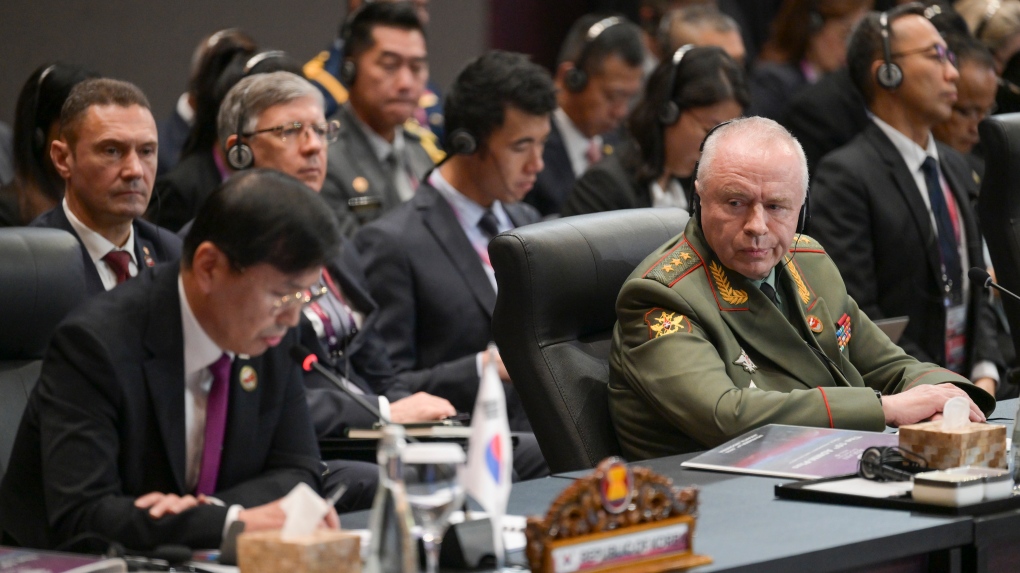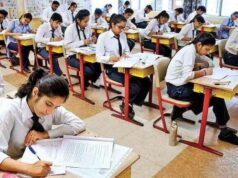ASEAN defence Ministers call for the fighting in Gaza to cease but struggle to address Myanmar violence

Southeast Asian defence ministers called Wednesday for an end to the Israel-Hamas war and for the world to collaborate on setting up humanitarian aid corridors in Gaza, but they struggled on how to address the prolonged civil strife in Myanmar.
Defence ministers of the Association of Southeast Asia Nations meeting in Jakarta also reiterated the significance of maintaining freedom of navigation and overflight in the South China Sea and respecting international rules to prevent maritime clashes in the disputed waters.
The 10-nation ASEAN includes Myanmar, but its defence minister was again barred from attending this week’s meetings due to the military government’s failure to comply with a five-point peace plan drafted to ease the violence.
“We are saddened with a deteriorating situation in Myanmar,” Indonesia’s Defence Minister Prabowo Subianto said in an opening speech. “Indonesia encourages other ASEAN member states to support Myanmar to find a peaceful and durable solution to the current situation.”
ASEAN has been trying to enforce the plan it forged with Myanmar’s top general in 2021, which calls for an immediate end to the violence, the start of talks brokered by a special envoy among contending parties, and the delivery of aid to displaced people. But Myanmar’s military government, which seized power in 2022, has done little to enforce the plan.
A joint declaration also called on the parties in a decades long territorial dispute in the South China Sea involving China and rival claimants from Southeast Asia to agree to an early conclusion of negotiations for a nonaggression pact.
The defence ministers on Thursday will be meeting with ASEAN’s eight dialog partners, where the territorial disputes are expected to be raised.
Subianto in his speech also touched on the Israel-Hamas war. “Indonesia is deeply saddened by the deteriorating situation in Gaza, particularly the horrid humanitarian conditions,” he said, adding violence against civilians “must stop.”
“Conversely, efforts to achieve a cease-fire must continue and the safe passage of humanitarian aid must be wide and accelerated,” he said.
ASEAN has not made a formal statement about the war, which is not surprising given each member of the bloc sees the conflict differently.
Indonesia, Malaysia and Brunei — the three ASEAN members with Muslim-majority populations where religion is significant in domestic politics — have long been strong supporters of the Palestinians. None of them has diplomatic relations with Israel.
Malaysia’s Defense Minister Mohammad Hasan condemned the bombings of civilians, homes and hospitals in Gaza and “the consequential massacre of innocent lives, children, women and men.”
Singapore took a firm position against Hamas and strongly condemned the attacks the militant group launched inside Israel on Oct. 7, starting the war. Singapore has close defence relations with Israel, and its strong stance against Hamas leaves it out of step with its larger Muslim-majority neighbours.
“The more important lesson for us is that peace can be stolen or lost very quickly,” said Ng Eng Hen, Singapore’s defence minister. “While we are now a relative area of peace and security, we can lose it if we as leaders in our nations do not pay attention to the deteriorating situation in the Middle East and Asia.”
U.S. Defence Secretary Lloyd Austin and Russian Defence Minister Sergei Shoigu were set to join the meetings, but there is little likelihood of a talk between them.
Subianto separately hosted talks between ASEAN and the U.S. and Japan, and said that the bloc and Tokyo agreed to bolster their defense ties and cooperation in military technology.
Austin made earlier stops in Asia aimed at showing unity over Russia’s war in Ukraine and preventing differences on the Israel-Hamas war from deepening. He also met with South Korean Defence Minister Shin Won-sik and others in Seoul to discuss boosting nuclear deterrence against North Korea.
China is represented at the meetings by Jing Jianfeng, the deputy chief of staff of China’s Central Military Commission, but it is unlikely he will meet with Austin on the meeting sidelines. China’s previous defence minister, Li Shangfu, was ousted last month, and Beijing has not named his successor.
Military contacts between the U.S. and China were largely severed after then-House Speaker Nancy Pelosi visited Taiwan in August 2022, prompting China’s military to hold unprecedented exercises near the self-governed island.



